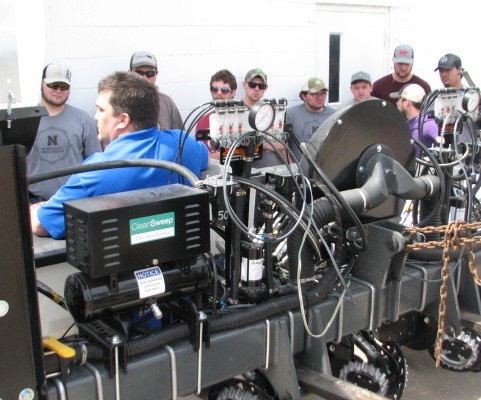Technology goes to the field

May 24, 2019
By Mary Crawford, NCTA News
CURTIS, Neb. – Agronomy students at NCTA now have “the latest and greatest” of modern field technology.
With the delivery last month of a new no-till planter, applied learning at the Nebraska College of Technical Agriculture in Curtis took a giant leap forward, says the NCTA alumnus who built the fully-equipped 6-row planter.
Anson Nielsen, a 1999 graduate of NCTA’s Agricultural Production Systems program, is a Minden-area farmer and owner of Nielsen Ag Equipment.
He spends winter months building customized crop planters for customers of Precision Planting®, the company for whom he is dealer.
His alma mater needed and wanted to update its academic resources for the classroom and field laboratory.
So, once Nielsen got the nod last fall from agronomy professor Brad Ramsdale to proceed, he coordinated suppliers, components, volunteers, and even neighbors as contributors and builders.
The new planter replaces one that Nielsen recalls using decades ago, as an NCTA student of his mentor and Ag Mechanics instructor Gary Wach.
“I told Dr. Ramsdale a couple years ago that NCTA needed a new planter in order to attract students to the college,” Nielsen shares.
“So, when Brad called and said he had some grant money to build a planter, I said that’s enough to do what I think you need.”
Nielson, who also graduated in 2001 in agricultural science from the University of Nebraska-Lincoln with a minor in agronomy and ag business, said he immediately got busy acquiring components.
“A lot of suppliers wanted to donate things,” Nielsen said. He was able to find many donated components or lock in significant discounts.
Components came rolling in such as the tool bar and gauge wheels, back closing and fertilizer system, meters, brackets, top units, row cleaners, hydraulic cylinders, labor and much more.
After he was able to get into the fields in early May, Professor Ramsdale quickly learned the “bells and whistles” of new technology for the Delta Force V Drive system, supplying hydraulic downforce and independent row control for correct seed placement.
The technology is ideal for teaching in real-time or building long-term archives, Nielsen.
“His students could be in the classroom and he could stream that planter as he plants. All of his maps and so forth they could put up into the Cloud for later use,” he said.
Nielsen estimates it is at least a $50,000 planter. A federal Perkins fund grant of $9,000 kick-started the project.
“The reason I did it was I had been out there at the campus farm with Brad,” Nielsen said.
“I knew what my business’ capability was for this planter, and I knew what a great school it is, and was from when I was there in the late 90.”
A full listing of component donations, in-kind services and monetary gifts is still underway. More resources and equipment can further add to the college’s diversified agriculture and agronomy courses, Nielsen said.
“I just wanted to enhance what these kids are doing, and learning on, at the college,” Nielsen emphasized. “That is the type of planter they will see out in the industry now. It will be a great for recruiting.”
Download a PDF of this press release